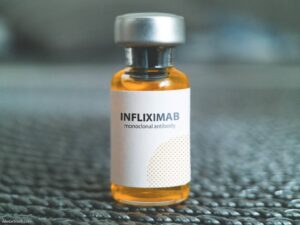 Pimentel et al. evaluated the influence of anti-infliximab antibodies on a cohort of patients with axial spondyloarthritis (axSpA) at three different points of care: 1) response to and tolerance of infliximab, 2) tapering strategy in patients who achieved sustained remission, and 3) subsequent treatment with a second tumor necrosis factor (TNF) inhibitor in patients who did not achieve sustained remission.
Pimentel et al. evaluated the influence of anti-infliximab antibodies on a cohort of patients with axial spondyloarthritis (axSpA) at three different points of care: 1) response to and tolerance of infliximab, 2) tapering strategy in patients who achieved sustained remission, and 3) subsequent treatment with a second tumor necrosis factor (TNF) inhibitor in patients who did not achieve sustained remission.
Methods
A prospective cohort of 60 patients with axSpA who were receiving infliximab were retrospectively evaluated regarding clinical data, infliximab and anti-infliximab antibody levels. Patients were evaluated at baseline, after six weeks and during the following intervals: weeks 12–14, weeks 22–24, weeks 48–54, weeks 96–102 and before tapering or switching.
Results
Anti-infliximab antibodies were detected in 27 patients, 23 of whom became positive for anti-infliximab antibodies in the first year of infliximab treatment. Patients with anti-infliximab antibodies were less likely to have been prescribed methotrexate as a concomitant treatment to infliximab; had more infusion reactions at 22–24 weeks and 48–54 weeks; experienced more treatment failures at 48–54 weeks; had reduced overall infliximab treatment success and lower rates of sustained responses.
These patients also exhibited more difficulty tapering off of infliximab than patients who tested negative for anti-infliximab antibodies. In the cases of patients for whom infliximab treatment was unsuccessful, patients with anti-infliximab antibodies had better clinical responses to the second, alternative TNF inhibitor at three and six months than the patients without anti-infliximab antibodies.
Conclusions
This study provided novel data that anti-infliximab antibodies are a parameter for reduced tapering success, reinforcing the clinical significance of anti-infliximab antibody detection. Additionally, Pimentel et al. confirmed association of anti-infliximab antibodies with worse infliximab performance and as predictor of a good clinical response to a second TNFi.
For complete details, including source material, refer to the full study.
Excerpted & Adapted From:
Pimentel CQ, Medeiros-Ribeiro AC, Shimabuco AY, et al. Long-term follow-up of anti-infliximab antibodies in radiographic axial spondyloarthritis patients: A marker of drug survival and tapering. Arthritis Rheumatol. 2024 Oct;76(10).


